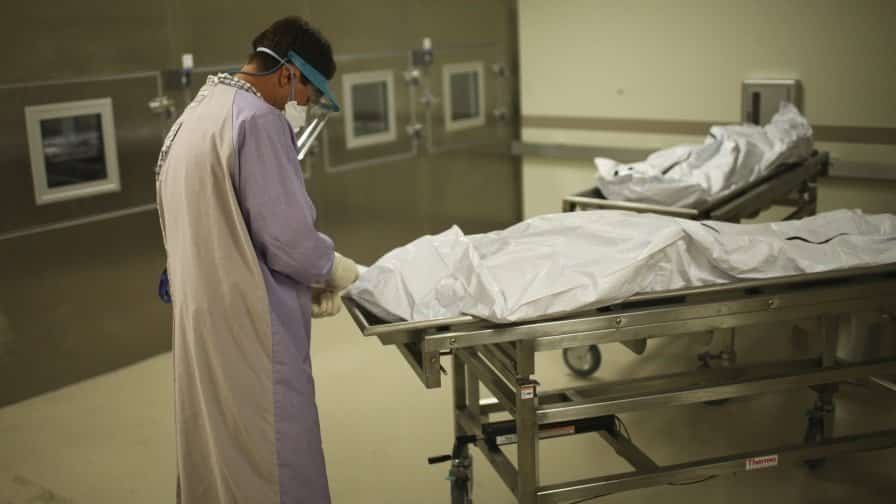News
First Cases Of COVID-19 Contracted From Infected Corpses Reported in Thailand
- A recent report showed that a dead body who succumbed to coronavirus still has possibilities of transferring the virus to another person.
- Thai health experts warned workers working in morgues or funeral home to use protective gears when handling infected dead bodies in order to prevent exposure.
- The World Health Organization denied that there are risks posed by dead bodies. However, they confirmed that workers handling corpses may contract tuberculosis, bloodborne viruses and gastrointestinal infections.
Health experts in Thailand confirmed the first case of a medical examiner contracting coronavirus (COVID-19) from a dead patient who succumbed to the disease. Authorities from the country are now warning those working in morgues and funeral homes about the possible dangers of handling corpses.
As the reports tell us, scientists in Thailand were prompted to conduct a study after two of its forensic team members died of COVID-19. They suspected the workers got infected from the corpses they recently handled.

“This new disease is a new challenge for the medical community since during the COVID-19 outbreak, medical personnel might get infected,” medical experts Won Sriwijitalai and Viroj Wiwanitkit wrote in a letter submitted to the Journal of Forensic and Legal Medicine.

In a letter posted in an online Journal of Forensic and Legal Medicine, we learn that authorities are now tracing about where the forensic medicine professional and a nurse assistant contracted the COVID-19. In the journal, they said that during the time they got the virus, the patients in Thailand are mostly “imported cases” and there was no local infection in the community yet.
This means community infection posed a low chance that the two victims came into contact with infected patients. It is highly possible, they said, that the forensic medicine professional and the nurse assistant may have been infected through biological samples and corpses that they handled.

“Although patients may get the infection from workplace exposure or through spreading in the community, at the period of the occurrence of this case, the patients in Thailand are mostly imported cases and recording of local spreading in the community is limited,” the two experts said as they shared their observation on the country’s coronavirus cases.
They then overruled the possibility that the two medical professionals contracted the virus from living infected patients.

“There is low chance of forensic medicine professionals coming into contact with infected patients, but they can have contact with biological samples and corpses,” Won and Viroj stressed.
The letter then called on all health department around the world to look into this type of transmission, and urged all medical professionals to wear protective gears when treating living patients and even in handling dead infected bodies.

The authors also suggested to conduct the same disinfection procedure applied in operating rooms to prevent forensic personnel from being exposed of the virus.
CUNY’s John Jay College of Criminal Justice on pathology professor Angelique Corthals also said that protective gears should also be worn by morgue technicians and workers in funeral homes, since they are also exposed to corpses who succumbed to coronavirus.

So far, there are no in-depth researches on how long the new COVID-19 can survive in corpses or whether or not it is contagious to people who handle them.
As of posting, Thailand has 2,623 confirmed cases of COVID-19. Aside from the two medical professionals, there were 39 others who have died from the virus while 1,405 patients have recovered.

The World Health Organization (WHO), on the other hand, released a statement clarifying that there are “no risks posed by dead bodies”. In its statement, the health institution said that there isn’t enough scientific proof to declare that corpses can indeed transmit the virus to the living.
WHO explained further that most “agents” do not survive long in dead bodies.
However, the organization confirmed that workers who “routinely handle corpses” may “risk contracting” diseases such as tuberculosis, bloodborne virus like hepatitis B and C and HIV, and gastrointestinal infections, including E. coli, hepatitis A, rotavirus, diarrhea, salmonellosis, shigellosis, and typhoid or paratyphoid fevers.

-
OMG6 years ago
Man Iced Neighbor Who Repeatedly Asked Him “When Are You Getting Married?”
-
Interesting7 years ago
The Secret Meaning of Anklets And Why Some Wives Wear Them
-
Interesting7 years ago
Waking Up Between 3 to 5 AM Could Mean You’re Experiencing Spiritual Awakening
-
Interesting6 years ago
Pork Fat Is Officially One of the World’s Most Nutritious Foods































